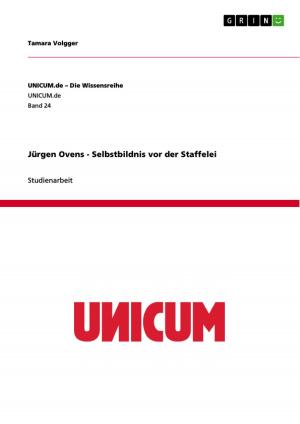Antioxidants, Cancer and Chemotherapy (Review Article)
Nonfiction, Science & Nature, Science, Biological Sciences, Zoology| Author: | Mehnaz Mazumdar | ISBN: | 9783640980680 |
| Publisher: | GRIN Verlag | Publication: | August 9, 2011 |
| Imprint: | GRIN Verlag | Language: | English |
| Author: | Mehnaz Mazumdar |
| ISBN: | 9783640980680 |
| Publisher: | GRIN Verlag |
| Publication: | August 9, 2011 |
| Imprint: | GRIN Verlag |
| Language: | English |
Scientific Essay from the year 2011 in the subject Biology - Zoology, Madhab Chandra Das College, Sonai (-), language: English, abstract: The term 'antioxidant' coined in 1920 denote substance that fight against any sort of oxidation process (chemical process in which oxygen is caused to combine with other molecules. Most oxidations occur with the liberation of large amounts of energy). The prefix 'anti' of the word antioxidants indicate that it works 'against' or 'in opposition' to the activity of oxidants. Here oxidants indicate free radicals. Free radicals have attracted a great deal of attention in recent years. They are mainly derived from oxygen (reactive oxygen species/ROS) and nitrogen (reactive nitrogen species/RNS), and are generated in our body by various endogenous systems, exposure to different physicochemical conditions or patho- physiological states. Free radicals can adversely alter lipids, proteins and DNA (Deoxyribose nucleic acids) and have been implicated in aging and a number of human diseases including cancer. Antioxidants applications in this regard have become an interesting and introspective arena of research. Antioxidants can fight against these free radicals and protect the body from the various adversaries. When talking of antioxidants, the most widely acclaimed and discussed terminology are the dietary and herbal natural antioxidants which are mostly from plant sources. Scientific evidence strongly holds the promising concept of application of antioxidants against Cancer and also against the side-effects of Cancer Chemotherapy. Antioxidants like Vitamin C, Vitamin E, Quercetin, Curcumin and many others have immense potential to play an important part in Chemotherapy and also in fighting against wide range of cancers. Keywords: Antioxidant; Cancer; Genetic damage; Vitamin C; Vitamin E; Curcumin; Quercetin
Scientific Essay from the year 2011 in the subject Biology - Zoology, Madhab Chandra Das College, Sonai (-), language: English, abstract: The term 'antioxidant' coined in 1920 denote substance that fight against any sort of oxidation process (chemical process in which oxygen is caused to combine with other molecules. Most oxidations occur with the liberation of large amounts of energy). The prefix 'anti' of the word antioxidants indicate that it works 'against' or 'in opposition' to the activity of oxidants. Here oxidants indicate free radicals. Free radicals have attracted a great deal of attention in recent years. They are mainly derived from oxygen (reactive oxygen species/ROS) and nitrogen (reactive nitrogen species/RNS), and are generated in our body by various endogenous systems, exposure to different physicochemical conditions or patho- physiological states. Free radicals can adversely alter lipids, proteins and DNA (Deoxyribose nucleic acids) and have been implicated in aging and a number of human diseases including cancer. Antioxidants applications in this regard have become an interesting and introspective arena of research. Antioxidants can fight against these free radicals and protect the body from the various adversaries. When talking of antioxidants, the most widely acclaimed and discussed terminology are the dietary and herbal natural antioxidants which are mostly from plant sources. Scientific evidence strongly holds the promising concept of application of antioxidants against Cancer and also against the side-effects of Cancer Chemotherapy. Antioxidants like Vitamin C, Vitamin E, Quercetin, Curcumin and many others have immense potential to play an important part in Chemotherapy and also in fighting against wide range of cancers. Keywords: Antioxidant; Cancer; Genetic damage; Vitamin C; Vitamin E; Curcumin; Quercetin















